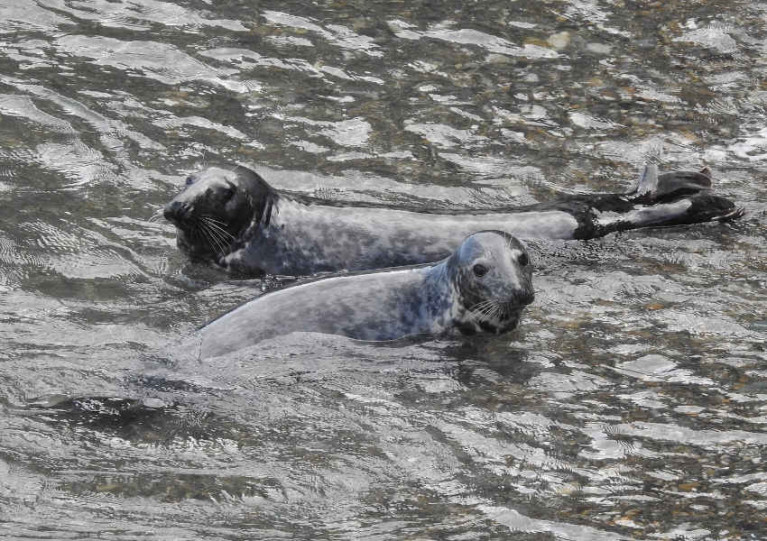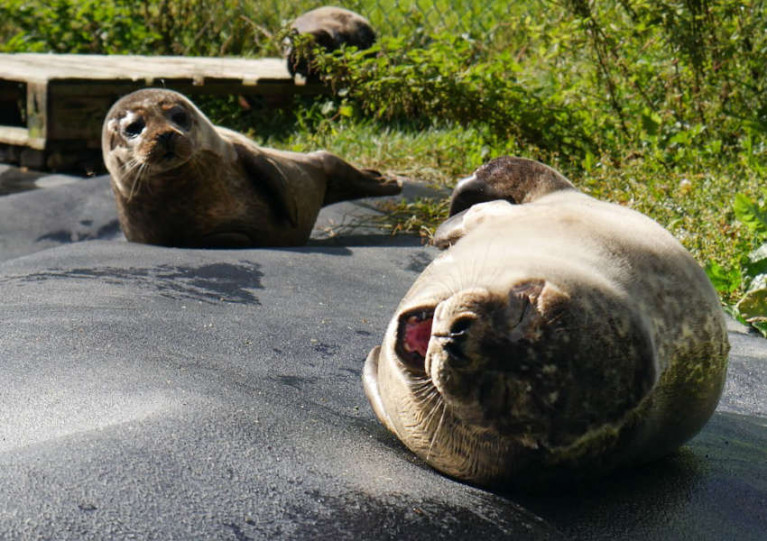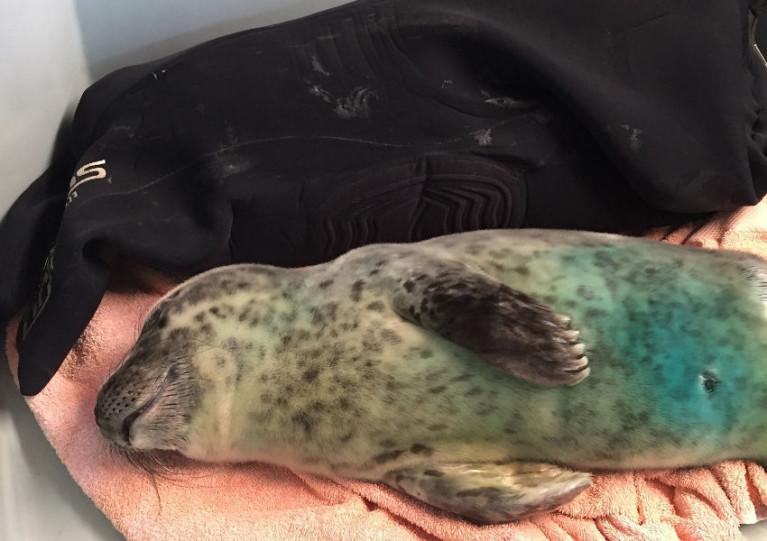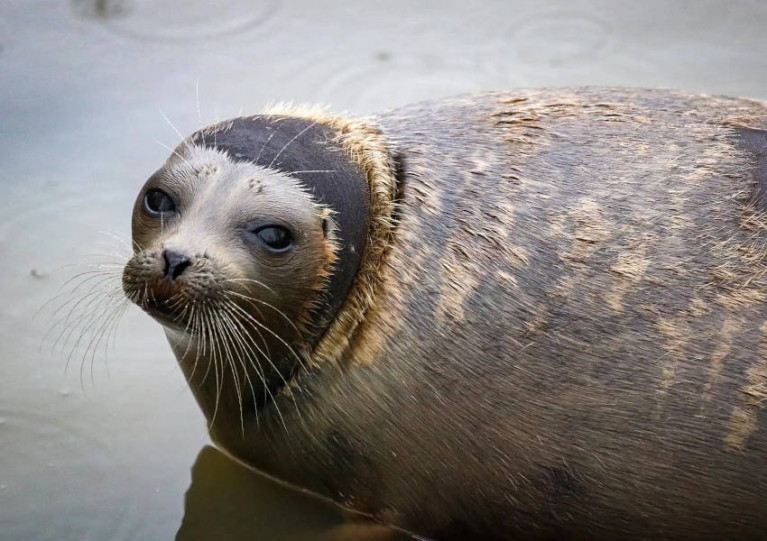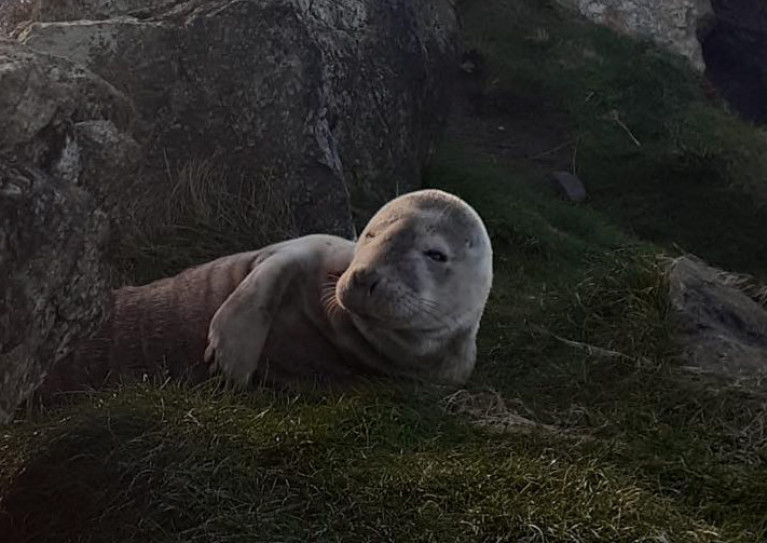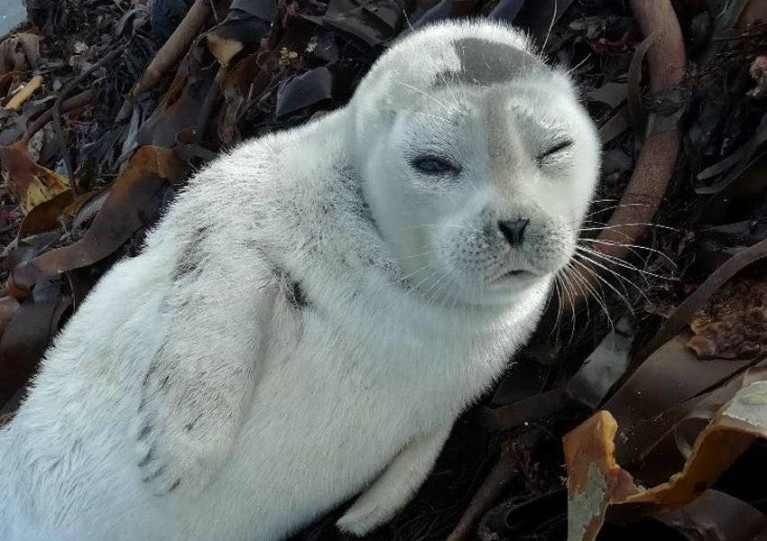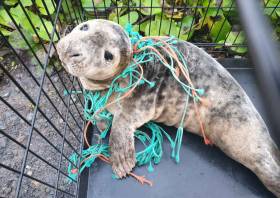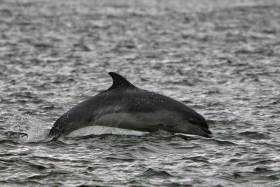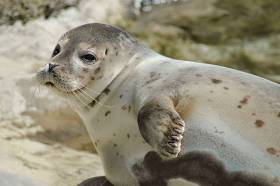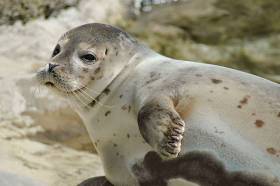Displaying items by tag: Seal Rescue Ireland
‘Huge Rise’ In Dead Seals Includes Many With Apparent Gunshot Wounds
A “huge rise” in dead seals recorded around the Irish coast includes a number with what appear to be gunshot wounds.
As the Irish Examiner reports, Seal Rescue Ireland has released figures from its ‘deal seal database’ which show 202 reports in 2020, more than double the number in 2019.
This year alone the figure has reached more than 60 of the protected marine wildlife species washed up within just six weeks, predominantly on the South and South East coasts, with some of the latest in East Cork between Ballycotton and Shanagarry.
A number of these and other carcasses have been found with holes in their bodies.
But Melanie Croce of Seal Rescue Ireland says that without proper post-mortems, it is impossible to confirm if these wounds are from gunshots or even related to the cause of death.
In a comment to Afloat.ie, Croce added: “Based on the evidence we’ve been seeing, the most likely cause of death is due to being caught up in storms (climate change) as well as being caught in fishing nets and drowning (bycatch).
“The holes, which do appear in large numbers of the carcasses being reported, are most likely due to scavenging animals.”
The Irish Examiner has more on the story HERE.
Update 17/2/21: This article was updated to correct the headline and intro and include additional comment.
Volunteers with Seal Rescue Ireland walked 117km — a kilometre for every seal the charity rescued last year — to raise much needed funds for their efforts last month.
As the Gorey Guardian reports, the ‘Seal Stride’ challenge took the place of their usual fundraising efforts amid the continuing coronavirus situation.
And the marine wildlife charity’s staff were joined by supportive members of the public walking, running or jogging to reach the 117km mark between them over the month of September.
“We were delighted to get people involved and track their own kilometres,” said Seal Rescue Ireland intern Amy Dodd, who came up with the initiative, “but tie it in to the fact that Seal Rescue Ireland is down 88% of funds compared to last year.”
The Gorey Guardian has more on the story HERE.
Old wetsuits have been upcycled as stand-in ‘mammas’ for orphaned seal pups at a Wexford marine wildlife sanctuary, as RTÉ News reports.
Seal Rescue Ireland in Courtown has been using the creations of local designer Lynn Houghton to help in the care of very young seals, some of them only a few days old.
Poor weather conditions during this pupping season have seen dozens of seal pups rescued after being separated from their mothers.
But with the ‘wetsuit mammas’ — essentially neoprene fabric stitched and stuffed into shapes resembling adult seals — at hand, it’s hoped to reduce the stress they experience as they’re nursed back to health.
RTÉ News has more on the story HERE.
Seal Rescue Ireland’s Vital Work Continues Under Lockdown
Seal Rescue Ireland has shared videos from its latest releases of seals nursed back to health at the Courtown marine wildlife sanctuary.
Honeysuckle and Clover’s return to the wild last Thursday (9 April) follows the release of Edelweiss and Hibiscus two days previously.
Both releases were done away from the public by special arrangement with the local authority under the current movement restrictions against Covid-19.
But the vital rehabilitation work of Seal Rescue Ireland and other such charities continues, while adhering to Government guidelines — and public support for their efforts is welcome now more than ever.
Another recent successful release was that of Cloudberry, the little Arctic seal pup who won the hearts of her carers after she was recovered from the Kerry coast ahead of Storm Brendan in January.
Over 10 weeks in the care of Seal Rescue Ireland staff, Cloudberry was nursed to full health and her ideal weight.
But the challenge was where and how to release her, as growing concerns over the coronavirus pandemic in mid March ruled out original plans to fly her to Iceland or Scandinavia.
And what’s more, there were fears that if she were to remain in captivity much longer, she might become too dependent on humans and never be able to return to the wild.
So a compromise was reached and, acting fast, the team spirited Cloudberry to the far north of Ireland at Malin Head in Donegal, from where it's hoped she will have the best chance of meeting others of her species.
Seal Rescue Ireland has more on the story HERE.
Hook Lighthouse Staff Fall For Grey Seal Pup Now In Care Of Sanctuary
Courtown’s sanctuary for rescued seals has something of a ‘local celebrity’ among its number, as the Irish Mirror reports.
Bottlebrush — one of 10 young seals recovered during Storm Brendan that are currently in the care of Seal Rescue Ireland — won the hearts of Hook Lighthouse staff who discovered the pup next to the iconic light a week ago.
It’s thought that Bottlebrush became separated from his mother during last week’s stormy conditions, and was found in poorly condition — suffering from congestion and a “deep painful cough”, according to Seal Rescue Ireland’s Sam Brittain.
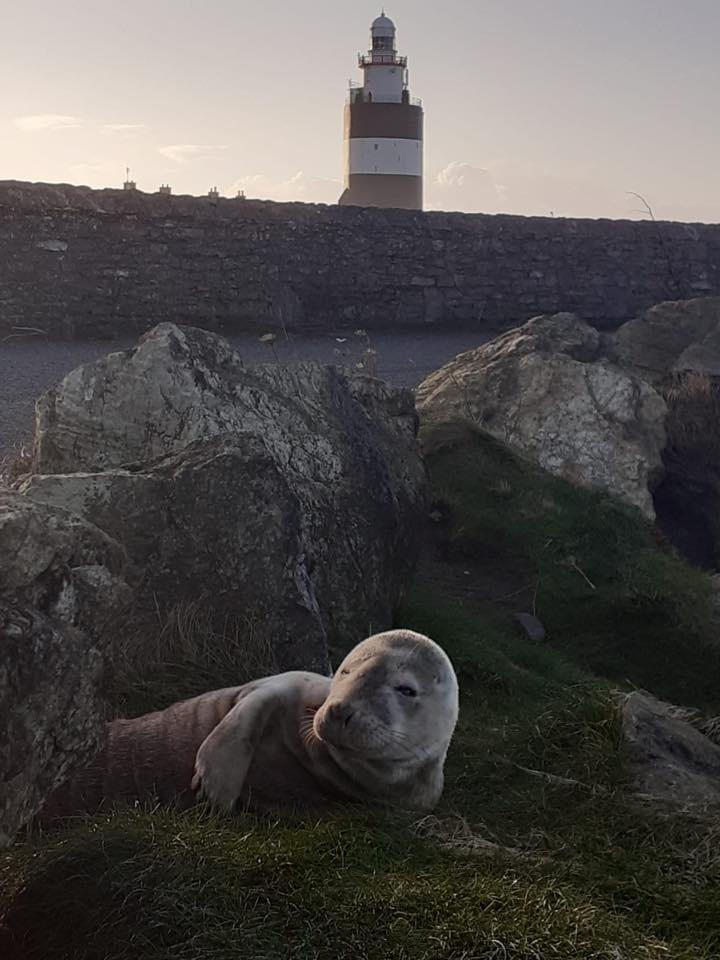
Along with three other new patients at the marine wildlife sanctuary, grey seal Bottlebrush has been named after Australian flora to raise awareness of efforts to help Australians affected by the recent bushfires.
While not very story at Seal Rescue Ireland is a happy one, as the centre recently lost little Heath who was suffering from a severe abscess on his shoulder, one with a more positive turn as of late is Cloudberry — the Arctic ringed seal found earlier this month in Co Kerry.
It’s still not known how the pup wound up hundreds of miles south of her home region, but it’s suspected that record high temperatures in northern Russia this winter have been forcing female Arctic seals to seek shelter in unusual spots.
An Arctic ringed seal pup recovered from the Kerry coast ahead of Storm Brendan has delighted her carers by finding her appetite.
Named Cloudberry, after an Arctic flower, the little marine mammal was first spotted on 2 January but scarpered before rescuers could reach her.
However, she was found again on Sunday afternoon (12 January) some 150km away in Quilty and made her way into the care of Seal Rescue Ireland in Courtown, Co Wexford.
The wildlife rehab centre said that in the 10 days between she had lost condition and strength and became dehydrated, so she was given fluids and allowed to rest.
“We have to be exceptionally careful with this little lady, as ringed seals are known to become stressed very easily when handled, and can over heat and suddenly die (known as capture myopathy),” said the animal rescue charity.
But a strong heartbeat gave her carers hope, and they were cheered even further when she chowed down on some fish yesterday morning (Tuesday 14 January).
As Cloudberry’s condition improves, the next step for her carers is to determine her age which could be anywhere from four weeks to 10 months — older pups will have parasites that will require treatment for a full recovery.
“Being our first ever experience with a ringed seal, we are in contact with both the Alaska SeaLife Center and Zeehondencentrum Pieterburen [in the Netherlands] who have both had experience rehabilitating them, and they are helping to give us advice on her specific needs.”
Seal Pup Entangled In Netting Is Rescued In Waterford
A seal pup found entangled in fishing netting in Co Waterford yesterday (Wednesday 27 November) is now recovering, as Waterford Live reports.
Nicknamed Pine, the young seal is now in the care of Seal Rescue Ireland in Courtown, Co Wexford after it was rescued by Waterford SPCA from Portally Cove, south-west of Dunmore East.
Keep an eye on the Waterford SPCA Facebook page for more details on his progress.
Marine Wildlife Groups Share In €2.5M Funding For Animal Welfare
#MarineWildlife - Four marine wildlife organisations will share in €2.56 million in funding for animal welfare throughout the State, as announced yesterday by Marine Minister Michael Creed.
Seal Rescue Ireland in Courtown, Co Wexford receives €12,000 for its efforts in rehabilitating seals and other marine wildlife, as well as providing training for rescuers across the country.
In other awards, Galway & Claddagh Swan Rescue in Barna has been allocated €5,000, while the Irish Whale and Dolphin Group receives €3,000, and the Oiled Wildlife Response Network, based at Shannon Foynes Port, will get €1,000.
“These bodies provide a great service to the community in their work in safeguarding animals,” said Minister Creed of the awards for 111 animal welfare groups.
“Many of today’s recipients provide facilities for neglected animals that sadly in a large number of instances have been abandoned by irresponsible owners, and the increased funding being awarded is evidence of my department’s ongoing commitment in protecting animal welfare and a recognition of the important role played by the many organisations throughout the country in safeguarding animals, particularly pet and companion animals.”
Training For Achill Islanders In Seal Rescue Protocol
#MarineWildlife - Islanders’ attempts to rescue a seal pup stranded on Achill in Co Mayo recently were sadly not successful.
But the incident has galvanised a local group set up amid growing concerns over marine wildlife strandings, who will train with a team from Seal Rescue Ireland in January on potential lifesaving measures, as the Mayo News reports.
“We’re getting these trainers down just so people know what to do in these situations,” said Achill resident Sorsha Kennedy. “It’s okay for them to be on the shore, they may just be resting, but people don’t know that.”
Kennedy was part of a group that attempted to rescue a baby seal washed up on rocks at Keel Beach in late November.
The pup unfortunately died in transit to Seal Rescue Ireland’s base across the country in Courtown.
“It’s a terribly long stressful journey for an animal already in distress,“ said John Nikolai, who discovered the seal while walking his dog. “It’s such a pity there isn’t another sanctuary closer in the west.”
The Mayo News has more on the story, while Afloat.ie reported recently on other seal rescue efforts around the Irish coast.
Seal Rescue Centre Seeks Sponsors
#MarineWildlife - The Seal Rescue Centre in Courtown is appealing for new sponsors to fund supplies for the marine wildlife in its care, as the Gorey Guardian reports.
The sanctuary recently took on its first sponsor in Gorey’s Amber Springs Hotel, which now has its name displayed over one of the 12 kennels available.
More than 60 seals are being kept at the Co Wexford centre that has a busy winter period taking in rescued seals and seal pups, the latest of them brought in from Clogherhead in Co Louth at the end of January.
But the Seal Rescue Centre is also celebrating successful releases back into the wild of seals it has treated — like Nala, an orphaned seal found in distress at Union Hall in West Cork last October, according to the Southern Star.



























